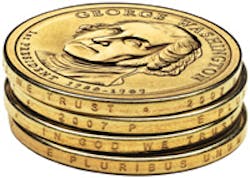Dollar Coin Alliance Opposes Bill To Modify $1 Coin Program
The Dollar Coin Alliance, a coalition of small businesses, budget watchdogs, transit agencies and labor groups, announced their opposition to the “Currency Efficiency Act,” a bill sponsored by Massachusetts Senators Scott Brown and John Kerry to modify the federal $1 coin program.
The bill comes despite the fact that repeated nonpartisan studies by the Government Accountability Office have shown that replacing the $1 note with a $1 coin would save billions of dollars for taxpayers, the alliance claims. Brown and Kerry represent the state of Massachusetts, home to the supplier of $1 note currency paper.
“Unfortunately, it seems the Senators have chosen to protect a local business at the expense of the American taxpayer,” said former Congressman Jim Kolbe, honorary chairman of the Dollar Coin Alliance in a prepared statement. “At a time when the government needs to be looking to save every dollar, we can’t continue to play the same Washington game of serving narrow special interests with half-measure legislation.”
“If the Senators are truly interested in saving money, they would support the elimination of the dollar bill, not the dollar coin,” said Tom Schatz, president of the Council for Citizens Against Government Waste. “Compared to $1 notes, coins last 9 times longer, cost 83 percent less for mass transit companies to process and cost 47 percent less to process at Federal Reserve Banks.”
Last week, Congressman David Schweikert introduced the Currency Optimization, Innovation and National Savings (COINS) Act (H.R. 2977), a bill to modernize the nation’s currency system by eliminating the $1 note. The COINS Act would require Federal Reserve Banks to stop issuing the $1 note four years after enactment of the legislation or when circulation of $1 coins exceeds 600 million annually – whichever comes first.
“We urge the Senators to join us in our effort to achieve a real, lasting taxpayer savings by moving fully to a $1 coin,” added Congressman Kolbe. “The COINS Act is the only legislation to date that responsibly reforms our currency system and reduces the deficit.”
While dollar bills last only a few years, a $1 coin can remain in circulation for more than 30 years. This means a single dollar coin can replace up to 17 dollar notes during its lifetime. Additionally, while billions of dollar notes are shredded and sent to landfills each year, $1 coins are 100 percent recyclable – meaning that even after coins are pulled from circulation, they can be melted down and forged into new coins.
The private sector also stands to benefit from a dollar coin transition. Jammed dollar bills in vending machines cost the industry hundreds of millions in annual repair costs and lost sales. Evidence from the transit industry indicates that it is six times less expensive for businesses with high levels of cash transactions to process $1 coins versus $1 bills.
“With all the talk in Washington of draconian budget cuts and austerity measures, switching to the dollar coin makes sense,” said Tom Buffenbarger, president of the International Association of Machinists. “It reduces the deficit without cutting any programs that hurt working people or raising the tax burden on the middle class.”
The Dollar Coin Alliance is a coalition of American small businesses, budget watchdogs, trade associations and labor organizations with a singular focus of moving the U.S. toward an economical, environmentally friendly dollar coin. Members include Citizens Against Government Waste, the International Association of Machinists, Southeastern Pennsylvania Transportation Authority, Tri-State Automatic Merchandising Council and United Steelworkers.
